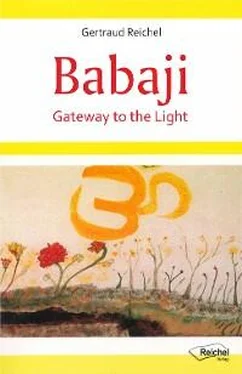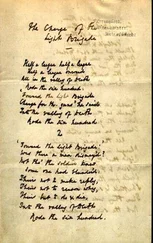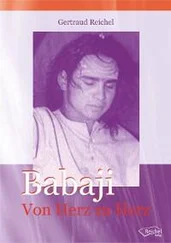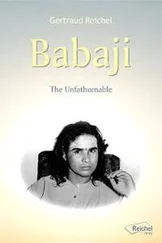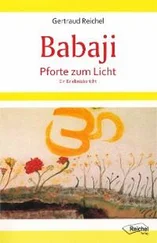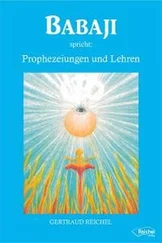For the next twelve days it seemed all of Calcutta had come to see Babaji. Our hosts had put an advertisement, complete with photo, in the newspaper. From early afternoon till late at night, people in their thousands came squeezing into the hall, offering him flowers and sweets, receiving his blessings and streaming out again. Outside on the streets they waited in dense hot crowds eventually to form into a never-ending queue. I found a place to sit inside the hall and put my full attention on Babaji. Nothing could distract me. Through my eyes I absorbed him, drawing his appearance into my soul. I wanted to hold on forever to the image of a good father, loving and caring. Softly I tuned into the singing and wondered what made people come to Babaji. It was obvious that not all of them were driven by spiritual aspirations, more perhaps by curiosity.
I considered this a while, and then an explanation came, in the typical manner in which Babaji often answers questions. I saw that a seed starts the sprouting process the moment it is watered. The urge to grow spurs its longing for more water. If the seed is receiving and absorbing more nourishment, it prospers and bears fruit. If it is lacking, the seed fades and withers. And so it is with humans.
I only had eyes for Babaji. I didn't need to talk to anybody but could be alone with myself and my thoughts. Apparently some gossip had started up among some Indians about my sharing the same room with so many men. Well, I couldn't be bothered.
Shastriji only appeared in our room during the day, spending the time quietly reading his holy books and keeping to himself. He spent the nights in Babaji's room. Sri Muniraj had his bed on the opposite side of the room and when he was not with Babaji he also read holy books, mainly the 'Haidakhandi Sapta Sad', Prayers in Honour of the Divine Mother. Now and then he smiled at me encouragingly and enquired about my well-being. I was still having trouble sleeping, but this state changed the minute Babaji entered the room and stood quietly for a few seconds by my bed. In the nights that followed I slept deeply and dreamlessly.
***
As at Haidakhan, the mornings began with a ceremony which never failed to deeply move me, not since the first time I experienced it: between four and five in the morning Babaji gave chandan on the forehead to everybody who had been granted his permission. Chandan is a mixture of sandalwood powder and camphor and Babaji applied it with his fingers, usually in three horizontal or vertical strokes. A red dot consisting of pulverised kum-kum flowers marks the eyebrow-chakra, the spiritual third eye. The chandan is cooling and purifying and its yellow colour represents wisdom, while the red colour symbolises love.
Those short moments of encountering Babaji face to face when he applied chandan were very dear to me. Sometimes they were the only times a devotee could be so close to him. And each time it was a different experience. He might smile one day or appear aloof the next. In a roguish mood he might paint an extra dot on the ears, or on the lines around the eyes, or teasingly pinch an arm or ear, each gesture having some meaning or other.
After chandan we had the opportunity to meditate or to drink hot chai (tea with pepper, ginger, milk and sugar) out on the terraced roof where we were treated to the splendours of dawn breaking over Calcutta. Here we could witness this city come alive: people beginning to stir in their back gardens; cows wobbling about drowsily along street pavements; palm trees stretching and swaying to the feel of a fresh breeze coming up from the sea.
Most impressive of all was aarati, the ceremony of offering the light, celebrated morning and evening in front of Babaji. Our host and his family gathered before Babaji to do the honours. Religious hymns were chanted by everyone and bells were rung as Babaji's feet were washed and anointed and the smell of rosewater and heena perfume soon permeated the hall. A necklace of wooden beads and flower garlands were put round his neck and round his wrists. Specially prepared delicacies, such as barfis, were offered to him, as were nuts and fruits. Babaji took some of the offerings and distributed the rest to the crowd. He gave necklaces, blessed by his touch, to various people. These and other blessed items were always highly desired and esteemed by devotees. Some visitors were overloaded with gifts from Babaji, while others were given nothing. This difference evoked diverse emotional reactions.
The basis on which he distributed presents varied, depending on the individual. A person who did not expect anything often received gifts abundantly; another who asked for more, thinking he or she was being unjustly treated, received nothing. Babaji might overwhelm some people with presents or attention until they started to get thoughts of being someone special. He would then suddenly stop doing this. Abruptly, from one day to the next, he seemed not to care for them any more until they became aware of and corrected their attitude. Unconscious and primitive emotions and false ideas of self, like low self-esteem, were brought to the surface and transformed by this treatment.
Years ago during my second visit to Babaji, I also went through a painful experience when confronted with underlying jealousy. Never before had I experienced its force so strongly; this was new and strange. I thought I was going to explode. It erupted like a volcano, burnt itself out and hasn't returned since.
My husband, young son and I had travelled to Chilianaula to attend Navaratri. A new temple was to be inaugurated at the ashram, located where one could marvel at the vista of the Himalayas. Many people had arrived to celebrate with our beloved gum Babaji the nine-day festival in honour of the Divine Mother. There was great beauty around us: the ceremony itself held under a large, colourful marquee which shielded the congregation from the hot noonday sun; and the snow-covered Himalayan peaks glistening in a luminous, clear, blue sky. Babaji blessed us all as we came to him in turn. He cuddled our five-year-old son and paid lots of attention to my husband, to whom he had assigned the job of standing close beside him and acting as guard and crowd controller.
After every darshan my husband would show me what Babaji had given him. A small silver box; a long silk cloth, a round smoothly polished onyx stone, a beige silk shirt and so on. At first I was pleased for him and his relaxed way of receiving these gifts. Then I got really upset. Apart from the usual prasad such as sweets, fruit or nuts, which Babaji gave us all, I hadn't been given a thing. It was obvious that Babaji preferred my husband to me. I was terrified realising I was enraged with jealousy.
It didn't make sense. I was devoted to my husband. How could I become jealous of a person with whom I was so intimately connected? I should be sharing in his glory. I didn't understand myself any more. Such intense jealousy was alien to me. Then, when my husband turned up in a long silk garment with a turban on his head looking just like an Indian raja, it was all too much for me. And when he told me how he came to have the turban, I could hardly contain my tears.
Apparently, Babaji had hurried out of the tent calling my husband to follow him and had headed down the garden path straight into his room. Among all the gifts from devotees neatly stacked in the little room was a pile of folded garments and lengths of rich fabrics. Babaji glided his hand over the folds until it came to a long piece of material with a small, delicate pattern.
"Turban from Rajasthan!", he said.
He told my husband to go to Shastriji and have him wind the turban round his head in the proper way. Babaji then returned to the area where the festival was taking place.
The Indian out suited my husband; being tall and slim, he carried it off well and looked quite distinguished. His blonde beard and fine features plus turban lent him an air of majesty. I struggled with my feelings. They had no right to confuse and upset my balance, but they did so and with surprising intensity. I felt ashamed of myself How could I face Babaji with such emotions? I refused to go to darshan and walked away instead, toward a clearing in the midst of a wood of fir trees. There I sat feeling flat and drained. I knew that only Babaji could help me with such a conflict and I implored him inwardly for his support. I asked him to take away from me forever this emotion which had overwhelmed me and which I did not want. An abyss opened up before me. Forgotten was the Babaji of my first visit to Haidakhan when he had put a most precious gift on my wrist, a bracelet. Not precious for its material value but for its spiritual wealth, for a bracelet symbolises connectedness, being tied together. I sat there with a bitter heart for a long while and returned to that place several times until I felt a change in my state.
Читать дальше
